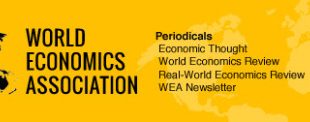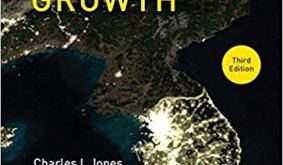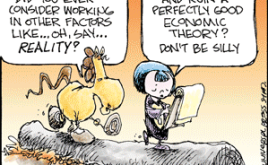Support the stream: https://streamlabs.com/deanbaker1
Read More »Krueger
from Peter Radford I want to note, with sadness, the death of Alan Krueger who was one of those economists undaunted by the existence of the real world and all its complexity, and had the courage to present conclusions based on empirical work rather than on pure theory. Others will write more cogently than I can about his impact on the profession, so I will simply note that his work, with David Card, on debunking the notion that a rise in the minimum wage will always cause higher...
Read More »RWER special issue: Economics and the Ecosystem
Real-World Economics Review – issue no. 87 Economics and the Ecosystem download whole issue Introduction 2Jamie Morgan and Edward Fullbrook download Growthism: Its ecological, economic, and ethical limits 9Herman Daly download Producing ecological economy 23Katharine N. Farrell download Economics 101: dog barking, overgrazing and ecological collapse 33Edward Fullbrook download Addressing meta-externalities:...
Read More »Dean Baker Live Stream
Support the stream: https://streamlabs.com/deanbaker1
Read More »Dean Baker Live Stream
Support the stream: https://streamlabs.com/deanbaker1
Read More »Beyond behavioral economics: the self-governance of nudging
from Maria Alejandra Madi Looking back, after the Second World War, new theoretical and applied work in economics fostered empirical techniques that included structural estimation, the development of input-output methods and linear programming. Among the theoretical advances, the Keynesian revolution, the mathematical modeling of the business cycle, game theory, dynamic modeling, new models of consumer behavior and general equilibrium analysis can be highlighted. What is significant about...
Read More »Dean Baker Live Stream
Support the stream: https://streamlabs.com/deanbaker1
Read More »Labor’s share — the ‘stylized fact’ that isn’t a fact at all
from Lars Syll According to one of the most widely used textbooks on mainstream theories of economic growth, one can for the United States “calculate labor’s share of GDP by looking at wage and salary payments and compensation for the self-employed as a share of GDP. These calculations reveal that the labor share has been relatively constant over time, at a value of around 0.7.” But is this “classic stylized fact” — that the labour share is relatively constant over time at around...
Read More »Uncertain
from Peter Radford I am not quite sure what to make of the phrase “radical uncertainty”. It pops up in most discussions of Keynes as being a critical, if not the critical, point of departure of his thinking from the silliness we know as classical economics. Is radical uncertainty a redundant statement? If something is uncertain, what is it that can make it radically so? Surely the whole point of uncertainty is that we have no idea just how radical that lack of knowledge may be. Worse,...
Read More »How to make economics a relevant science again
from Lars Syll Economists are struggling to explain recent productivity developments, the implications of rising inequality, the impact of persistently negative interest rates in the eurozone … and the sudden slowdown in European growth … None of this is a huge surprise, given the profession’s embrace of simplistic theoretical assumptions and excessive reliance on mathematical techniques that prize elegance over real-world applicability … All of this should tell economists that there is...
Read More » Real-World Economics Review
Real-World Economics Review




